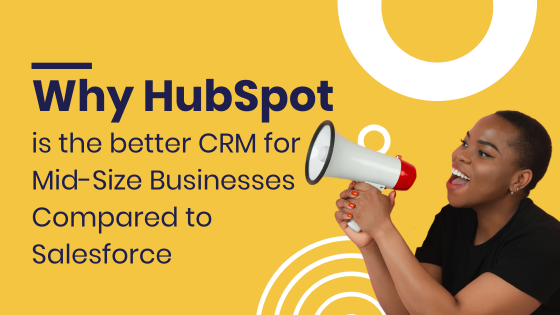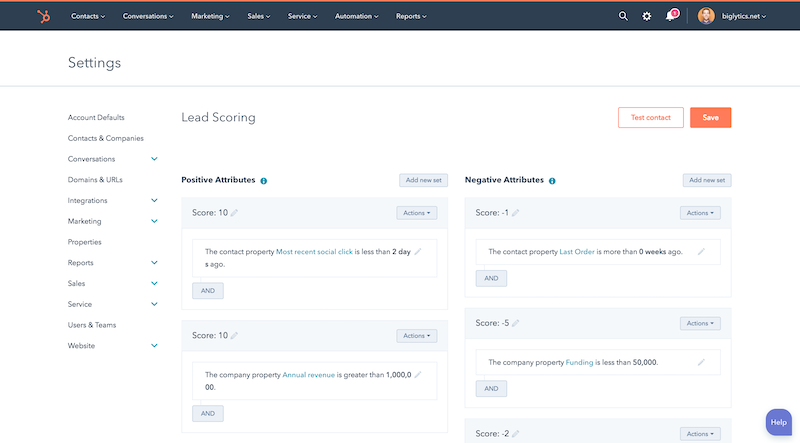


Why HubSpot is the better CRM for Mid-Size Businesses vs. Salesforce




As a mid-size business, you need a Customer Relationship Management (CRM) system that meets your unique needs and helps you succeed. While there are many CRMs available in the market, two of the most popular are HubSpot and Salesforce. While both have their strengths, HubSpot is the better CRM for mid-size businesses. In this article, we'll explore why.
Understanding CRM Needs for Mid-Size Businesses
Mid-size businesses have distinct requirements when it comes to a CRM. They need a system that can be easily scaled as their business grows, offers flexibility, and provides the features necessary for success.
One of the key challenges that mid-size businesses face is the ability to manage their customer relationships effectively. A CRM system can provide a central repository for all customer interactions, allowing businesses to gain a better understanding of their customers and their needs. By leveraging the data stored in the CRM, businesses can identify trends and patterns in customer behaviour, which can help them to optimise their sales and marketing strategies.

Key Features for Mid-Size Business Success
What's the best CRM?
Well, for starters... a CRM should have features such as lead management, deal tracking, and customer analytics to enable businesses to gain insights into customer behaviour and optimise their sales funnel. Additionally, a CRM should have email marketing capabilities, which allows businesses to nurture leads through targeted email campaigns tailored to their behaviour and past interactions with the business.

Another important feature of a CRM system is the ability to track customer interactions across multiple channels. This includes interactions through social media, email, phone, and in-person meetings. By tracking these interactions, businesses can gain a more complete picture of their customers and their needs, which can help them to provide better customer service and support.
Scalability and Flexibility Requirements
Mid-size businesses need a CRM that is able to keep up with their evolving requirements. As they grow, they need a system that can accommodate new users, adapt to changing business needs, and integrate with other tools to ensure data remains consistent across all their apps.
One of the challenges that mid-size businesses face is the need to integrate their CRM system with other tools and applications. This can include marketing automation tools, customer support software, and accounting software. By integrating these tools with their CRM system, businesses can ensure that data is consistent across all their applications, which can help to improve efficiency and productivity.
In addition to integration, mid-size businesses need a CRM system that is flexible and customisable. This allows them to tailor the system to their specific needs and requirements, which can help to improve user adoption and overall effectiveness.
In conclusion, mid-size businesses need a CRM system that is scalable, flexible, and provides the key features necessary for success. By leveraging the data stored in their CRM, businesses can gain insights into customer behaviour, optimise their sales and marketing strategies, and provide better customer service and support.
Comparing HubSpot and Salesforce: An Overview
When it comes to managing customer relationships, businesses have a plethora of options to choose from. Two of the most popular CRM systems are HubSpot and Salesforce. In this article, we'll take a closer look at these systems and compare them to help you determine which one is the best fit for your business.
HubSpot CRM: A Brief Introduction
HubSpot CRM is a cloud-based system that was launched in 2014. It is designed to help businesses of all sizes manage customer relationships. It provides an all-in-one platform that integrates marketing automation, salesforce automation, and customer service automation to ensure seamless communication across different departments.
One of the key features of HubSpot CRM is its user-friendly interface. The system is easy to navigate, and users can quickly access all the information they need.
HubSpot CRM also offers a range of integrations with other software, including email marketing tools, social media management platforms, and e-commerce solutions. This makes it easy for businesses to streamline their processes and manage all their customer data in one place.
Salesforce CRM: A Brief Introduction
Salesforce CRM, on the other hand, is an industry leader with a large customer base. It was launched in 1999 and has since become one of the most popular CRM systems on the market. It is known for its robust features, integrations, and scalability, making it a popular choice among businesses of all sizes.
One of the key advantages of Salesforce CRM is its flexibility. The system can be customised to meet the specific needs of businesses in different industries. It also offers a range of features, including lead management, sales forecasting, and analytics. These features can help businesses streamline their processes and make data-driven decisions.
Salesforce CRM also offers a range of integrations with other software, including marketing automation tools, e-commerce solutions, and customer service platforms. This makes it easy for businesses to manage all their customer data in one place and ensure seamless communication across different departments.
However, one of the drawbacks of Salesforce CRM is its pricing. The system can be expensive, especially for small businesses that are just starting. The learning curve can also be steep, and it may take some time for users to get used to the system.
Conclusion
Both HubSpot and Salesforce CRM offer a range of features and integrations that can help businesses manage their customer relationships more effectively. However, the best choice for your business will depend on your specific needs and budget. HubSpot CRM is a great option for small businesses that are just starting and have a limited budget, while Salesforce CRM is ideal for larger businesses that need a more robust system.
Ease of Use and User Experience
When it comes to choosing a CRM, ease of use and user experience are crucial factors to consider. A CRM that is difficult to use or has a steep learning curve can negatively impact a business's productivity and efficiency.
HubSpot's Intuitive Interface
One of the key advantages of HubSpot is its intuitive interface, which is designed to be user-friendly for businesses of all sizes. The platform's drag-and-drop functionality makes it easy to customide, and its customer support team is always available to help businesses navigate the system.
HubSpot's dashboard is also easy to understand, with a clear and organised layout that allows users to quickly access the information they need. The platform's user-friendly design makes it easier for employees to learn and adopt the system, increasing the chances of success.
Salesforce's Learning Curve
On the other hand, with Salesforce, there is a steep learning curve. It can take weeks, or even months, to master the system and understand it's capabilities fully. This can be a disadvantage for businesses in fast-paced industries that require quick action and efficient decision-making.
However, once employees have mastered Salesforce, it can be a powerful tool for businesses. Salesforce has a wide range of features and customisation options that can be tailored to meet the specific needs of a business.
The Importance of User Adoption
User adoption is crucial for a CRM to be successful. If employees do not use the system correctly, it will not be effective and may negatively affect the business.
HubSpot's intuitive interface and user-friendly design make it easier for employees to learn and adopt the system. Additionally, HubSpot offers extensive training and support resources to help businesses ensure that their employees are using the system correctly.
When it comes to Salesforce, businesses may need to invest more time and resources into training their employees to use the system effectively. However, with the right training and support, Salesforce can be a powerful tool for businesses.
In conclusion, when choosing a CRM, it is important to consider the ease of use and user experience. HubSpot's intuitive interface and user-friendly design make it a great option for businesses of all sizes, while Salesforce's steep learning curve may require more time and resources to master. Ultimately, the success of a CRM depends on user adoption, so it is important to invest in training and support to ensure that employees are using the system correctly
.
Integration and Customisation
HubSpot's Seamless Integrations
HubSpot offers seamless integrations with multiple third-party apps, making it easier for businesses to consolidate their data and streamline their processes. Additionally, HubSpot's open APIs allow businesses to build custom integrations and automate tasks further.
Salesforce's AppExchange Marketplace
Salesforce has an extensive app marketplace called AppExchange, which allows users to search through thousands of apps and add-ons to find the ones that best fit their business. However, many of these apps come at an extra cost, making it more expensive and less accessible for mid-size businesses.
Customisation Options for Mid-Size Businesses
Both HubSpot and Salesforce offer customization options, allowing businesses to tailor the CRM to their specific needs. However, HubSpot's drag-and-drop functionality and customer support make it easier for businesses to make these changes themselves, while Salesforce may require additional personnel or consultants to make changes to the system.
Conclusion
In conclusion, while both HubSpot and Salesforce are powerful CRMs, mid-size businesses should choose HubSpot for its affordability, user-friendly interface, and seamless integrations. Its drag-and-drop functionality and customizable options make it easy for businesses to adapt and scale as their needs evolve. So, if you're in a mid-size business, start your journey by signing up for HubSpot's free CRM!







